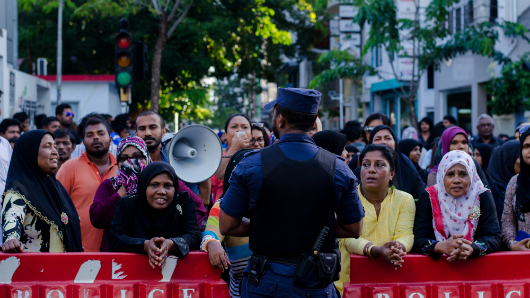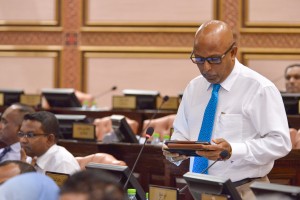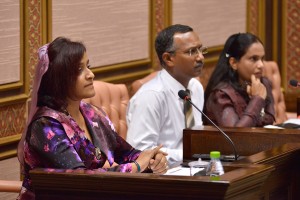Police have arrested opposition leader and former President Mohamed Nasheed.
Maldivian Democratic Party (MDP) Chairperson Ali Waheed tweeted around 2:45pm today that police have entered Maafanu Yaagoothuge to arrest the former president.
A large crowd of supporters gathered outside the former president’s residence as news of the arrest spread through the capital.
Minivan News journalists at the scene observed clashes between members of the public and Specialist Operations (SO) police.
While the police van with President Nasheed inside was stuck in the narrow alley for about 30 minutes, riot police used pepper spray indiscriminately to clear a path.

Minivan News also observed rocks being thrown at the SO officers.
President Nasheed was accompanied by his lawyer, Hisaan Hussain. The opposition leader is currently at the Dhoonidhoo detention centre.
Jumhooree Party (JP) Spokesperson Ali Solih has confirmed that Nasheed was arrested on terrorism charges over the controversial detention of Criminal Court Judge Abdulla Mohamed.
The arrest warrant issued by the Criminal Court states that the former president might abscond from the trial.
On February 16, the Prosecutor General (PG) had withdrawn charges against Nasheed for further review.
 Photo: Confrontation between police and Nasheed supporters at the time of his arrest
Photo: Confrontation between police and Nasheed supporters at the time of his arrest
Refresh for updates
3:45pm – According to the office of the former president, Nasheed has been transferred to Dhoonidhoo prison. MDP Chairperson Ali Waheed has also been taken into police custody.
4:03pm – PG Muhthaz Muhsin has reportedly filed terrorism charges against former President Nasheed at the Criminal Court. The first hearing of the case has scheduled for 4:00pm tomorrow (February 23). The charges were raised in relation to the military’s controversial detention of Criminal Court Chief Judge in January 2012.
Former Defence Minister Tholhath Ibrahim, former Chief of Defence Forces Major General Moosa Ali Jaleel (currently President Abdulla Yameen’s defence minister), former Brigadier General Ibrahim Mohamed Didi (currently MDP MP for mid-Hithadhoo), and Colonel Mohamed Ziyad also face terrorism charges.
 Photo: Protest outside Nasheed’s residence, Yaagoothuge, at the time of his arrest.
Photo: Protest outside Nasheed’s residence, Yaagoothuge, at the time of his arrest.
4:08pm – Following rumours of the impending arrest of JP Leader Gasim Ibrahim, protesters have gathered outside the Villa offices in the capital. The MP for Maamigili is believed to be inside the building. However, according to local media, the Criminal Court has denied that a warrant has been issued for Gasim’s arrest.
4:11pm: Three have been arrested outside the Maldives Monetary Authority building. Hundreds of opposition supporters are gathering at barricades at all roads leading to the Police HQ.
4:17pm: Before boarding a speed boat to Dhoonidhoo Island Detention Center, President Mohamed Nasheed told reporters: “I call on the Maldivian public to do everything necessary to stop the arrest and harassment of myself and other politicians to save the Maldives.”
4:23pm: Ruling Progressive Party of the Maldives (PPM) MP Ahmed Mahloof calls for Nasheed’s release and the withdrawal of charges in “national interest.”
4:35pm: Dozens of armed soldiers spotted outside the Coast Guard HQ in Malé. However, a military spokesperson told Minivan News there was no unusual activity within the military.
4:40pm: A Criminal Court official told Minivan News Judge Abdulla Mohamed took a leave of absence ahead of Nasheed’s trial over his detention. Judge Abdulla Didi is now in charge of the Criminal Court.
4:43pm: The Maldivian Democratic Party has called upon the PG and President Yameen to immediately release Nasheed, stating Nasheed “had never absconded from Court, nor have taken the opportunity to flee or go into hiding, during numerous opportunities he had in the past few weeks to travel abroad, and that he had expressly informed the judiciary and Prosecutor General that he does not have any intention to abscond from Court or avoid charges being brought against him.”
4:49pm: An official statement by the Maldives Police Services said the arrest warrant against Nasheed had been issued on the request of PG Muhsin.
A PG Spokesperson told Minivan News they had only requested for Nasheed’s arrest, although four others face the same charges and have been summoned to court at the same time.
4:55pm: The MDP claims warrants have been issued for the arrest of other senior members of the Maldivian Democratic Party, including the party’s spokesperson for international affairs Hamid Abdul Ghafoor.
The party condemned “in the strongest terms the brutality presently being inflicted on protesters with tear gas, peppers spray and assaults amongst gatherings of unarmed supporters of Presidnet Mohamed Nasheed.”
4:59pm: President’s Office Spokesperson Ibrahim Muaz Ali in a tweet stated: “I fully assure you this government will not arrest or detain any citizen unlawfully.”
5:09pm: Nasheed was first charged under Article 81 of the Penal Code, which states that the detention of a government employee who has not been found guilty of a crime is illegal.
He is now being charged under the 1990 Anti Terrorism Act, which states kidnappings and abductions and attempts to kidnap or abduct are acts of terror.
A PG Spokesperson told Minivan News the Prosecutor General is authorised to withdraw charges and resubmit a case on different charges.
If found guilty, he faces a jail term or banishment of ten and 15 years.
5:18pm: The office of former President Mohamed Nasheed has expressed concern over the PG’s decision to re-prosecute Nasheed on “trumped up charges of terrorism.”
“There is little hope President Nasheed can be afforded anything approaching a fair trial.”
Read the full statement here.
5:20pm: Hundreds of opposition supporters calling for Nasheed’s immediate release have gathered near the Seagull café, Maldives Monetary Authority (MMA) and JP Leader Gasim Ibrahim’s Villa offices.
Minivan News journalists observed dozens of SO officers active at the Republican Square.
The Maldives Police Services in a statement at 5:05pm have warned they will take action against any citizens who disobey the police or break police cordons.
 Photo: Protesters at the MMA area
Photo: Protesters at the MMA area  Photo: SO police at Republic Square
Photo: SO police at Republic Square
5:37pm: Demonstrators outside the MMA building are dispersing. However, a protest is ongoing near the Seagull cafe on Chandhanee Magu with MDP supporters calling for Nasheed’s release. Protesters remain behind police barricades.
6:11pm: Protests are ongoing near the Seagull café. Addressing the estimated 200-strong crowd, MDP supporter, Mariyam Agisa, 44, said: “We will not step back even if we are arrested or killed. We will do everything legally possible to oust this unjust government.”
MDP MP Eva Abdulla accused President Abdulla Yameen of arresting Nasheed in order to quell opposition protests against what they allege to be the PPM’s repeated violations of the constitution. The arrest comes ahead of a major opposition rally planned for Friday, February 27.
6:28pm: According to the MDP, at least six opposition supporters were arrested in the protests that followed Nasheed’s arrest today.
6:32pm: A police spokesperson confirmed one woman, a minor and five men were arrested on charges of obstructing police duty today.
 Photo: Protests at Seagull café
Photo: Protests at Seagull café
8:00pm: Government supporters on Twitter have started a hashtag, #ISupportNasheedArrest. Majority Leader Ahmed Nihan tweeted today: “No one is above the law.”
8:05pm: MDP Chairperson Ali Waheed has been released from ADK Hospital after treatment of injuries. The former MP claims police assaulted him during Nasheed’s arrest this afternoon. Waheed was initially taken into custody along with Nasheed, but was later transferred to hospital.
9:03pm: About a hundred protesters are gathered near Seagull restaurant divided by police barricades into two sections, one on Chandaneemagu and the other on Fareedheemagu.
Several protesters are carrying placards with photos of youth with their faces covered during a PPM march in the capital on Thursday.

Earlier today, police released a statement urging protesters not to cover their faces or involve minors and to demonstrate in accordance with the Freedom of Assembly Act as well as the Anti-Social Behaviour Act. Police warned action against unruly demonstrators who disobey orders and break police lines.
9:08pm: An emergency meeting of the MDP-JP Inter-parliamentary Commission (IPC) is ongoing at Maafanu Kunooz.
9:24pm: Speaking at the protest, MDP Chairperson Ali Waheed has called on the police and military to defend the constitution. He has called for continued protests and for MDP supporters from across the country to come to the capital on February 27 for a planned mass demonstration.
Waheed expressed confidence of gaining a majority in parliament for the MDP-JP alliance and predicted more arrests in the coming days. He claimed President Yameen arrested former President Nasheed out of fear that the opposition will secure a parliamentary majority.
9:32pm: Ali Waheed criticised police for failing to arrest a suspect so far in the murder of a 24-year-old last night, suggesting the Maldives Police Service was too politicised to focus on combating crime. Waheed repeated calls for the public to join the mass demonstration on February 27, scheduled to begin at 4:00pm.
Waheed contended that the current political instability stems from the PPM marginalising former coalition partner JP. The country needs a national unity government led by JP Leader Gasim Ibrahim, he said.

9:42pm: Following the MDP-JP IPC meeting, JP Deputy Leader Ameen Ibrahim read out a joint statement to the press.
“The arrest of former president and MDP president, Mohamed Nasheed, on accusations of terrorism is unacceptable to the JP and MDP. We believe the charges of terrorism against President Nasheed are politically-motivated. And we believe that this was an act intended to intimidate political opponents. Both parties call for the immediate release of President Nasheed,” read the joint statement.
Ameen appealed for the cooperation of all Maldivian citizens in the joint efforts of MDP and JP “to defend the laws and constitution.”
9:52pm: Speaking to Minivan News, former President Nasheed’s lawyer, Hisaan Hussain, noted that criminal court regulations stipulates that a defendant must inform the court two days in advance of his legal representation. As the first hearing of the trial has been scheduled for tomorrow, Hisaan said Nasheed might be denied the constitutional right to appoint a lawyer.
President Nasheed’s legal team will appeal the Criminal Court’s arrest warrant at the High Court, Hisaan revealed.
10:55pm: Speaking at the protest, JP Leader Gasim Ibrahim noted that the Prevention of Terrorism Act was enacted in 1990, 18 years before the adoption of the new constitution in August 2008, contending that 1990 law conflicts with the constitution.
Gasim reiterated calls for the PG to immediately withdraw the “politically-motivated” terrorism charges against President Nasheed.
Gasim also called on the government to immediately release former Defence Minister Colonel (Retired) Mohamed Nazim, who is currently being held in pre-trial detention after police allegedly discovered a pistol and bullets in his apartment.
The JP leader and MP for Maamigili vowed to continue the protests across the Maldives.

10:55pm: Former Police Commissioner and JP MP, Abdulla Riyaz, said police and military officers had taken an oath to ensure the peace and security of all Maldivian citizens and should not “under any circumstances” enforce orders of politicians to make arrests or provide false pretexts to justify arrests.
Riyaz suggested police were forced to enforce the orders of politicians, including the arrest of former Defence Minister Nazim, who he reiterated had been “framed”. Nazim would not be convicted in a fair trial, he added.
The MP for Thaa Kinbidhoo appealed for police to act in accordance with the constitution.
“You shouldn’t be afraid of losing your jobs,” he said, urging police not to commit an “unjust” act in the hopes of a promotion.
Speaking for a second time, Gasim said the international community was watching developments in the Maldives closely. Gasim also questioned the necessity of keeping Nasheed in custody on the grounds that he might flee the country.
11:16pm: Protesters have moved to the Chandaneemagu-Majeedheemagu junction. JP and MDP leaders are making speeches atop a pick-up in the middle of the road. The crowd now numbers in the several hundreds.
11:18pm: Protesters are now heading towards President Yameen’s private residence on Alikilegefaanu Magu.
11:25pm: Protesters have broken through police barricades blocking the path to President Yameen’s residence. Police have used pepper spray and pushed protesters back. Minivan News journalists have observed bottles being thrown at police.
11:28pm: SO police officers in full riot gear have arrived and started pushing back protesters from Alikilegefaanu Magu to Majeedhee Magu.
11:31pm: Minivan News journalists have observed riot police arrest a protester.
11:35pm: SO police officers have pushed back protesters and set up barricades blocking entry to the south side of Alikilegefaanu Magu.

12:05am: Shortly before midnight, SO officers approached the pickup and asked JP and MDP leaders not to use loudspeakers after 12:00am. However, the JP’s Sobah Rasheed continued speaking without turning off the loudspeakers on the pickup.
The SO officers retreated and have not made any move to confiscate the speakers.

12:15am: SO police officers have charged the crowd, pushed protesters back and taken two protesters into custody. The crowd has been pushed back beyond the city council office.
12:17am: Minivan News journalists have observed MDP MP Ali Azim being taken into custody. Police are using pepper spray to disperse protesters.

12:23am: Riot police have charged again with batons and are attempting to disperse the crowd. A fourth arrest has been made. Minivan News journalists have observed one man injured during the SO charge near the city council office.
12:27am: Riot police have cleared protesters from Alikilegefaanu Magu and Majeedhee Magu. Police have opened Majeedhee Magu to traffic. Officers of the Maldives National Defence Force (MNDF) with shields and riot gear remain near President Yameen’s residence.
12:41am: At least six people have been arrested. SO officers have since left the scene on a police vehicle. Some protesters have returned to the Alikilegefaanu and Majeedhee Magu junction. Pockets of protesters are also further down the road near Chandhanee Magu.
12:45am: Journalists saw an SO police officer shove a protester into a window of the New Line shop. The protester cut his hand and the glass was shattered by a baton.

1:00am: Protesters have now largely dispersed although a small crowd remains near the Chandanee Magu-Majeedhee Magu junction. SO officers have reportedly seized the pickup and are patrolling the street and attempting to prevent protesters congregating.
Minivan News has ceased live updates.
Likes (2)Dislikes
(2)Dislikes (0)
(0) 













